Posts Tagged ‘Staffordshire’
Tuesday, October 26th, 2010
A squat one cup bachelor’s teapot with raised Gothic Revival decoration on a pale blue paneled body, often mistaken for a piece from a child’s tea set. This salt glazed pottery teapot was made in the Staffordshire region of England in the mid 1800’s
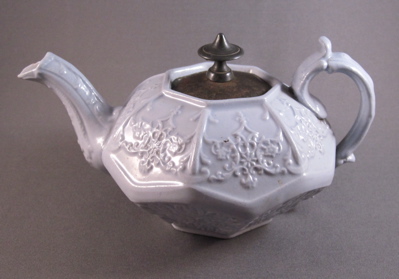
Teapot stands 3-1/4″ tall and has the same scrolled decoration on each panel
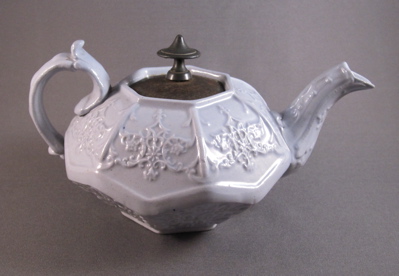
When the original lid became lost or broken, a metalsmith made a simple replacement metal lid of tin with a delicately turned pewter knob

Tags:English, metal lid, salt glaze, Staffordshire
Posted in teapot | 4 Comments »
Tuesday, August 31st, 2010
A rare soft paste pottery jug with transfer decoration and overglaze polychrome washes featuring a Napoleonic political cartoon. Made in Staffordshire, England and marked “T. Harley – Lane End”.
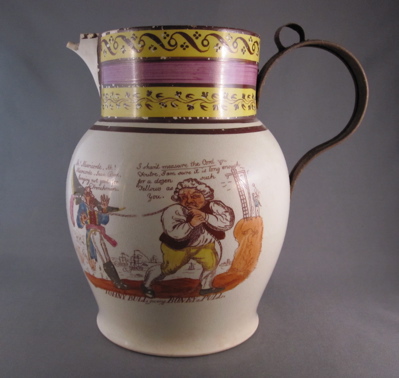
Thomas Harley (1778-1832) produced earthenware jugs and other wares in his Lane End (now Longton) studio from 1805-1812. In 1814 he was involved in a meeting which called for the abolition of the slave trade.
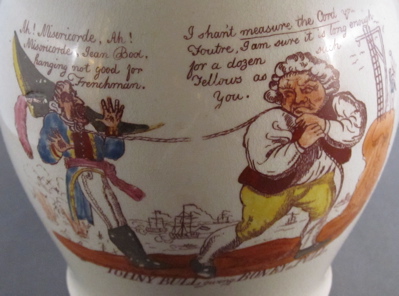
Jug measures 7-1/2″ high and is featured in AN ILLUSTRATED ENCYCLOPEDIA OF BRITISH POTTERY AND PORCELAIN by Geoffrey A. Godden, Bonanza Books Inc., N.Y., 1966.
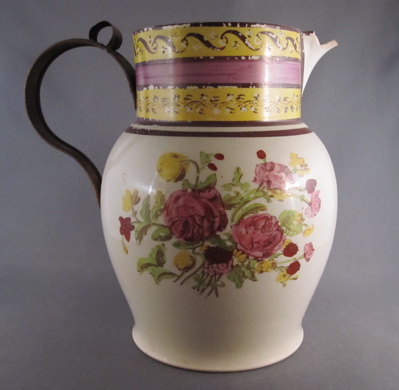
A now rusted metal handle with thumb rest, made by a metalsmith over 100 years ago, replaces the original damaged ceramic handle.

This rare example with intact handle shows what my jug looked like before a clumsy person dropped it.
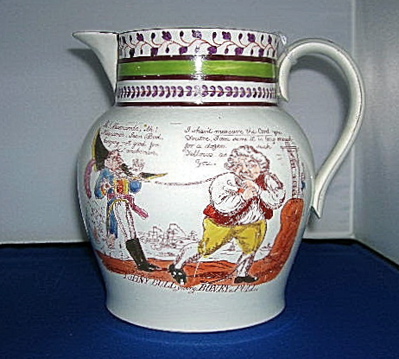
Photo courtesy of Commemorative Ceramics
Tags:commemorative, English, metal handle, soft paste, Staffordshire, transferware
Posted in jug | 1 Comment »
Tuesday, June 29th, 2010
A pottery cream jug made by John Ridgway & Co. in Staffordshire, England. The transfer printed decoration in brown & green is highlighted with red and green overglaze washes. This piece almost did not make it in to my collection. During my last trip to London in the spring of 2009, I saw the jug at an unattended market stall. Each time I went back to try and find the dealer, he was nowhere to be found. I almost gave up, but finally with the help of his neighbors, I tracked him down. Luckily, the price was right and after all of the effort, I had to buy it!

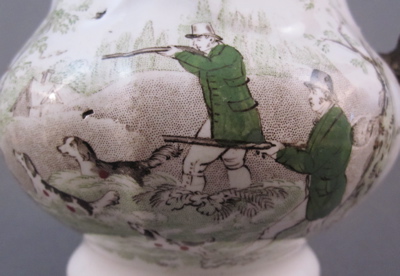
Jug measures 5″ high

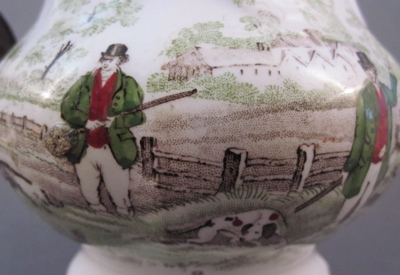
Marked on the bottom: “FIELD SPORTS, J R Co.” with an incised “2”
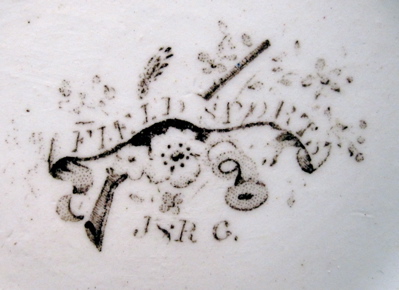
The replaced metal handle is bolted through the back of the jug
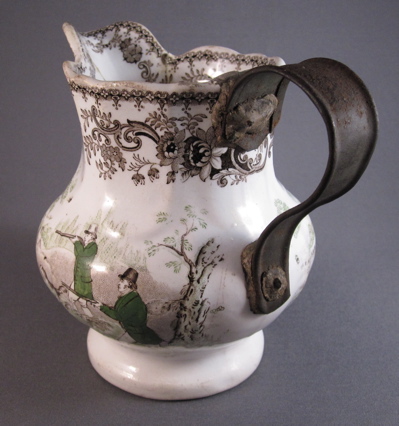
This jug, made by Elijah Jones in the Country Sports pattern, shows what the original handle on my jug may have looked like. As this piece was manufactured around 1830, it seems my jug was a copy of the successful design about 10 years later
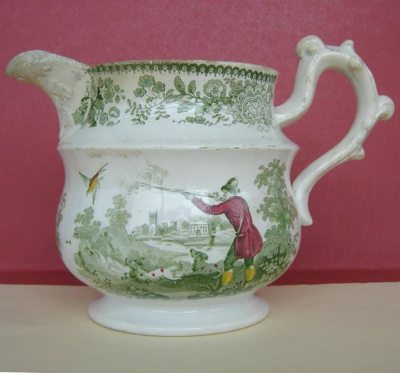
Photo courtesy of eBay
Tags:English, metal handle, pottery, Staffordshire
Posted in jug | No Comments »
Thursday, June 24th, 2010
English soft paste pearlware jug with copper lustre bands, pink lustre trim and applied low relief classical decoration of frolicking cherubs and animals. It was most likely made by Wedgwood around 1820.
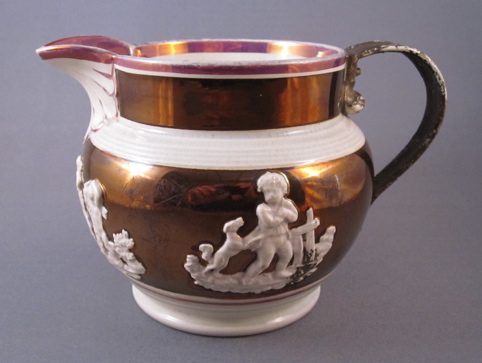
A metal bolt, visible just below the pink lustre band inside of the jug, holds the replaced handle securely in place
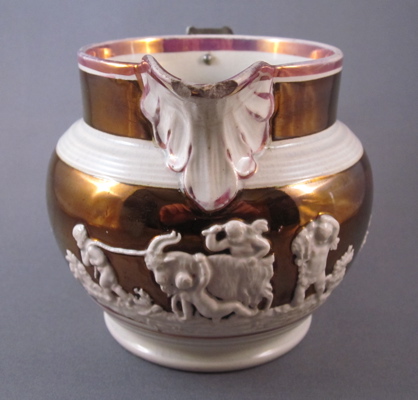
Jug stand 3-3/4″ tall and is 5-1/2″ wide
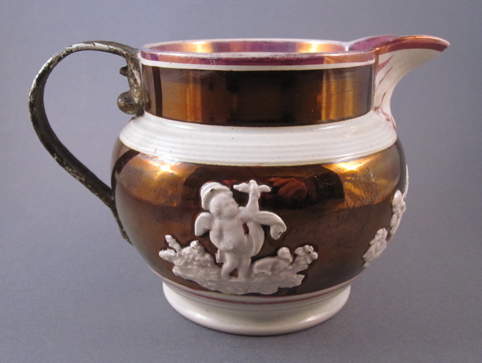
A metal handle was bolted on to the body of the jug to replace the original handle after it broke off. Curiously, the metal replacement was gilded to match the copper color of the jug and not white to more closely resemble the original handle color

This jug, with the same form and similar decoration, shows what the original handle of my repaired jug would have looked like
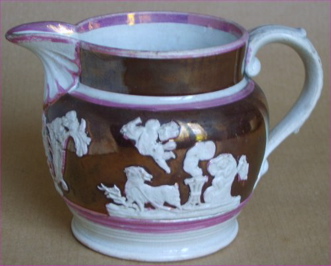
Photo courtesy of Aurea Carter Antiques
Tags:English, lustre, metal handle, pearlware, soft paste, Staffordshire
Posted in jug | 2 Comments »
Monday, May 24th, 2010
Each of these polychrome decorated jugs was purchased separately and in different countries one year apart. Both have the same relief stag & dog decoration and possess a similar metal replacement handle. They were most likely made in Staffordshire, England.
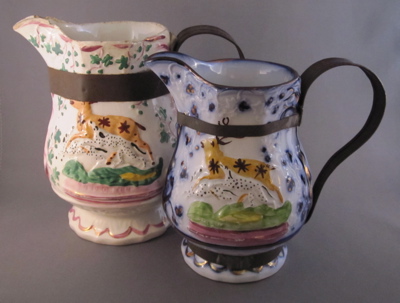
The larger jug (left) has pink lustre decoration and measures 6.5 inches tall. It was purchased in the UK, not far from where it was made.
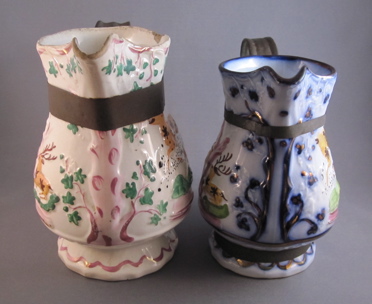
The smaller jug (right) was found in Maine and has a polychrome flow blue and pink lustre decoration. It stands 6inches tall.
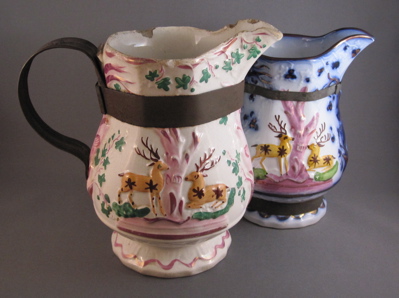
Both jugs have tin replacement handles of a similar design
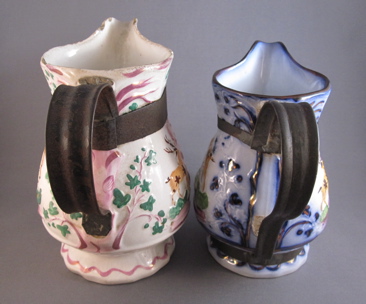
“EPSOM CUP” is impressed only on the larger jug
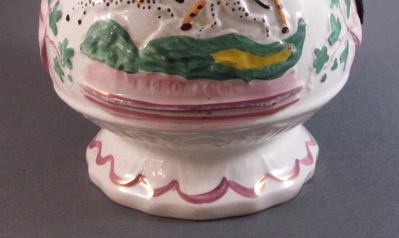
These three jugs of graduating size still have their original branch form handles
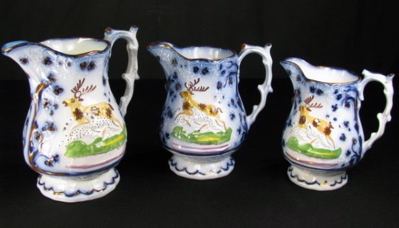
Photo courtesy of WorthPoint
Tags:English, metal handle, pottery, Staffordshire
Posted in jug | No Comments »
Thursday, May 13th, 2010
This large soft paste pearlware ale mug was most likely made in Staffordshire, England in the late 1700s. Standing 6-1/2″ tall, the mug is decorated in cobalt blue underglaze with the “Chinese House” pattern, a popular middle class replacement for similarly decorated Chinese porcelain, affordable only to the wealthy. I am quite fond of this loose, stylized decoration; a melding of Eastern and Western influences. The sturdy 19th century replacement handle, with thumb rest and support straps, is made of Britannia metal, aka Britannium, a composite made up of 93% tin, 5% antimony and 2% copper. A traveling tinker made repairs such as this for the townspeople who saved their cherished broken wares in need of his services. Members of the upper class would have taken their damaged goods to a silversmith, resulting in a more refined sterling silver replacement.
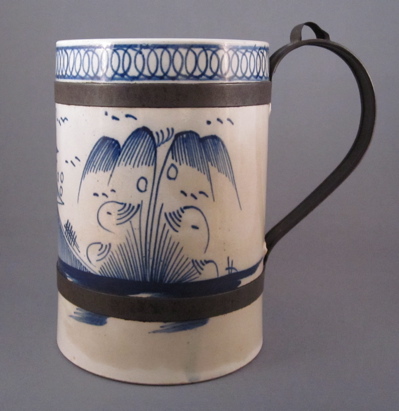

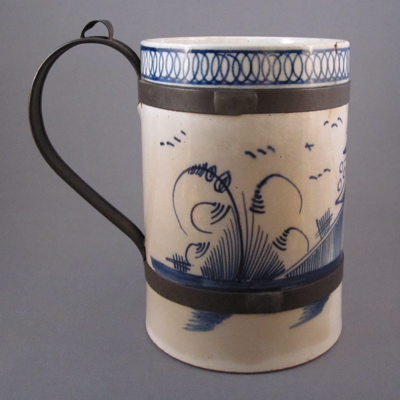
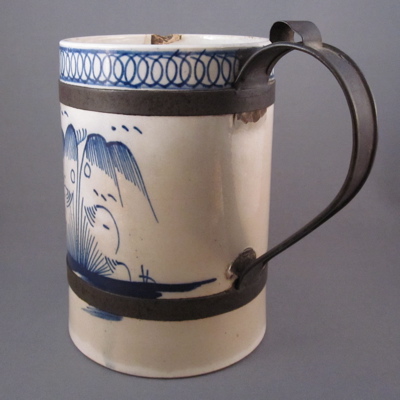
This is what the simple loop handle must have looked like before it broke off, as seen on this similarly shaped mug of the same period.
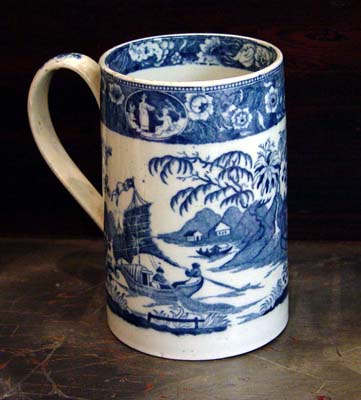
photo courtesy of Earle D. Vandekar
Tags:blue & white, English, metal handle, pearlware, pottery, soft paste, Staffordshire
Posted in mug/tankard | 2 Comments »
Sunday, April 4th, 2010
This little pearlware pottery mug was made in Staffordshire, England in the mid-1800’s and was meant to be a “Present for a good boy”.
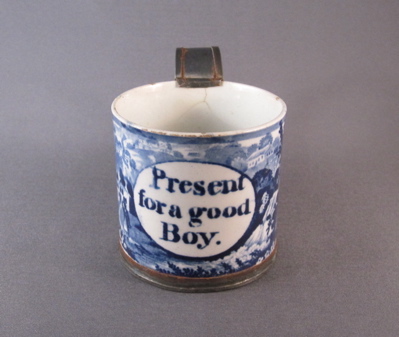
The cobalt blue transfer decoration depicts a bucolic country house with mother standing outside, a school and a waterfall.
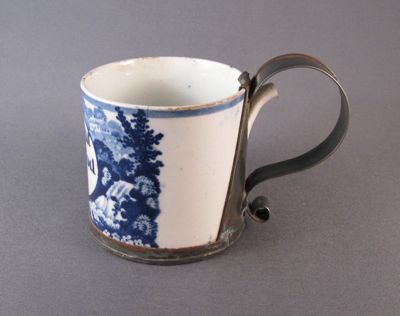
The sharp remains of the original ceramic handle protrudes from the unusual tin plate and scrolled handle repair, not ideal for the fingers of a small boy.
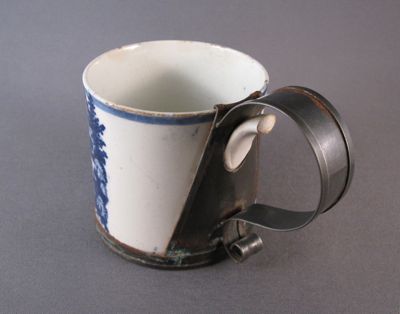
Mug measures 2-3/4″ tall.
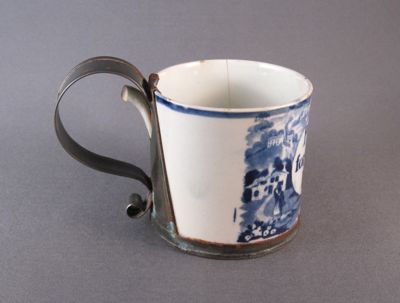
Even though the bottom of the mug is undamaged, it is completely covered in tin.
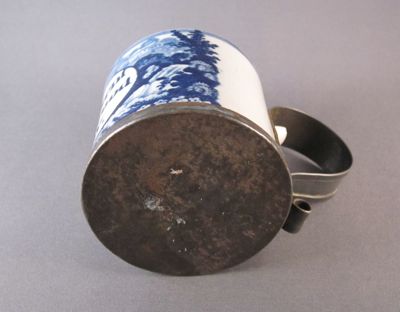
This child’s mug with similar form and transfer decoration has its original applied handle intact.
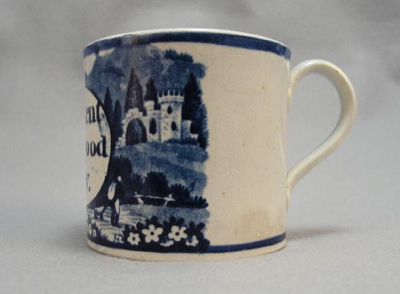
Photo courtesy of eBay
Tags:blue & white, English, metal handle, pottery, Staffordshire, transferware
Posted in mug/tankard | No Comments »
Wednesday, March 24th, 2010
Porcelain teapot made in the UK in the mid nineteenth century with matte finish neoclassical decoration, stands 7.25 inches long by 4.5 inches tall. I originally thought this teapot was made by Samuel Alcock but I have been told it was made by Dudson.
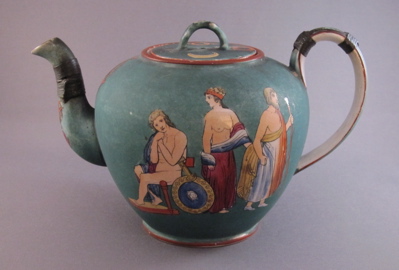
The other side of the teapot with chariot decoration.
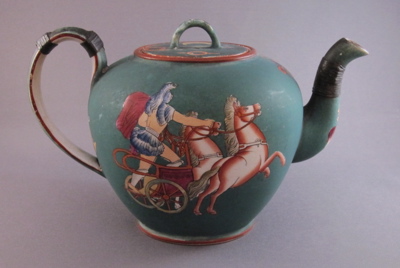
Both the handle and the spout have an unusual repair of tightly wrapped metal wire.
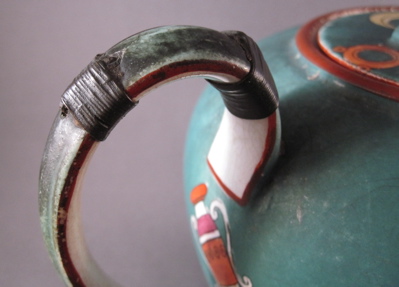
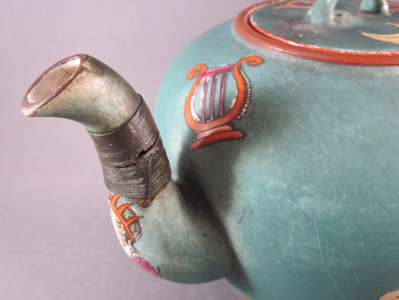
The undamaged lid has extra deep sides.
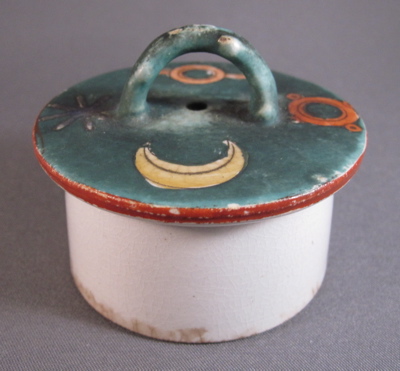
The teapot was also available with a black background, shown here without the wire repairs.
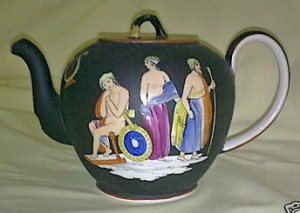
Photo courtesy of eBay
Tags:English, porcelain, Staffordshire, wire
Posted in teapot | 2 Comments »
Wednesday, March 24th, 2010
Parian salt glaze ewer with molded relief biblical design marked on the bottom: “Naomi and Her Daughters-in-Law”, made in the mid-1800’s by Samuel Alcock in Staffordshire, England.
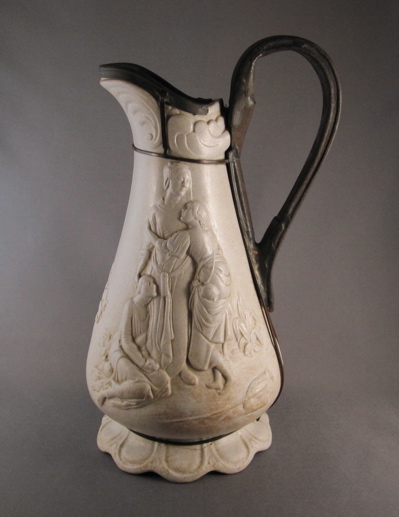
Ewer measures 9-1/2″ tall and has an intricately fashioned network of metal straps and wire.
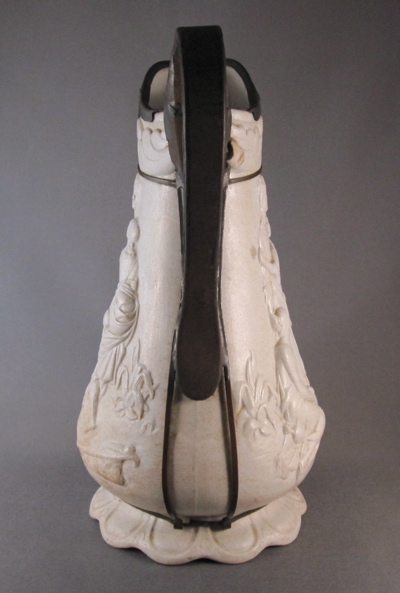
The large metal replacement handle stands in for the long gone original ceramic handle.
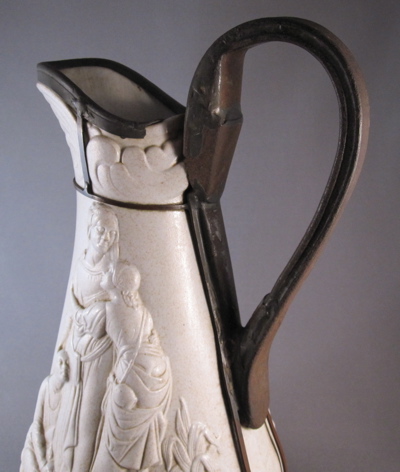
A lavender ewer showing the original, more ornate handle.
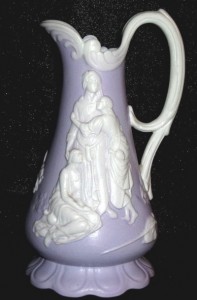
Photo courtesy of Monique’s Glass Boutique
Tags:English, metal handle, salt glaze, Staffordshire
Posted in decanter/ewer | No Comments »
Tuesday, March 23rd, 2010
This wonderfully graphic pearlware pottery sauce boat was made by I. Hall in Staffordshire, England in the early 1800’s. It has a dark cobalt blue transfer decoration in the “Quadrupeds” pattern featuring a fantastic fox on both sides.
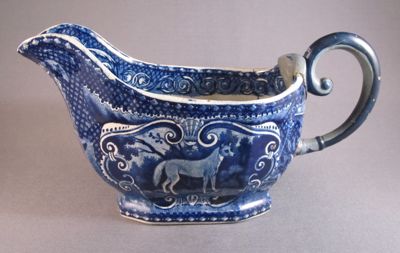
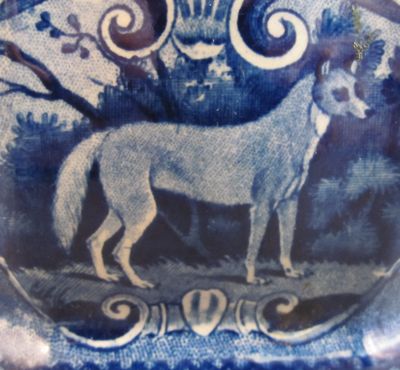
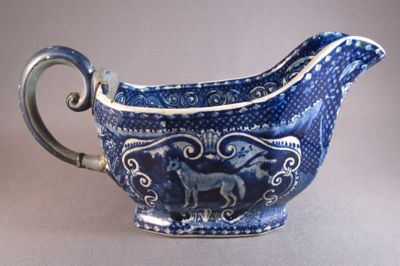
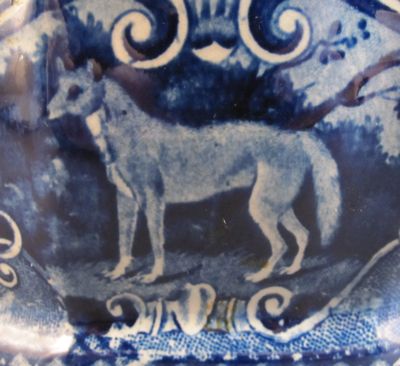
The replaced hollow pewter handle has been cleverly painted to match the decoration.
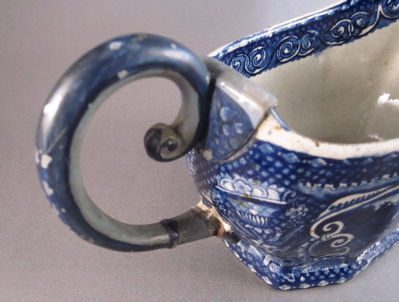
Sauce boat from the early 1800’s measures 3-7/8″ high, 7-1/2″ long.
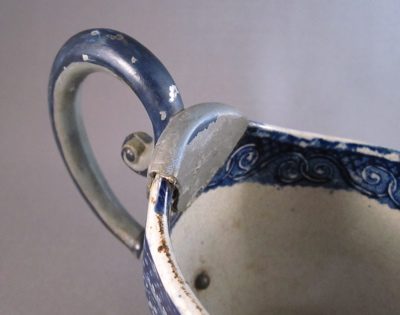
Sauce boat is boldly stamped in cobalt on the bottom I HALL, QUADRUPEDS.
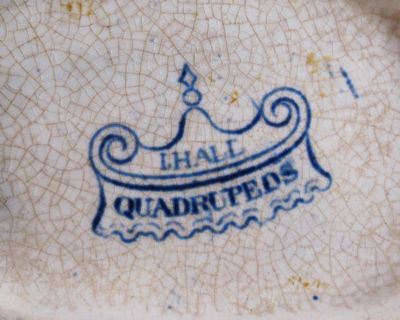
Another blue & white transferware sauce boat with its original handle.
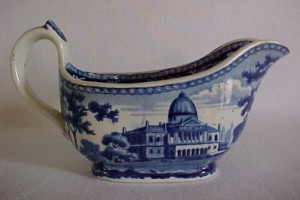
Photo courtesy of Richard G. Marden & Daughter
Tags:blue & white, English, metal handle, pottery, Staffordshire
Posted in sauce boat | No Comments »






















































